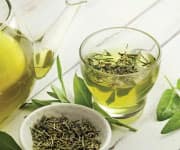Life Extension Magazine®
Doctors are increasingly recognizing the role that chronic stress plays in our health and immune systems.
Heart disease, digestive disorders, diabetes, cancer, and most importantly, our immunity can all be impacted by chronic stress.1-4
Over the past year Americans have reported feeling an extraordinary amount of stress affecting their well-being.5
Reducing the impact of stress has long been recognized as a significant aspect of any wellness program.
Scientists have identified two plant extracts that work to reduce stress and anxiety levels.
An amino acid called theanine, found in tea leaves, has been shown in clinical trials to relieve chronic stress.6-8
Lemon balm, an herb in the mint family, induces calm and lowers anxiety levels.9,10
Stress Impairs Immunity

In addition to its adverse effect on emotional wellbeing, chronic stress may shorten healthy lifespans via several detrimental pathways.11,12
Chronic stress suppresses the immune system, impairing the function of infection-fighting immune cells.2,13
It also spurs a long-lasting release of the steroid hormone cortisol and other signaling molecules that further weaken immune responses.2
Chronic stress is associated with increased levels of damaging inflammation.13,14
Chronic stress is also a factor in many cases of anxiety and depressive disorders.
The World Health Organization has ranked depressive and anxiety disorders as the first and sixth most important contributors, respectively, to non-fatal negative health outcomes.15
There are proven ways to reduce stress, including exercising, eating a healthy diet, and getting adequate sleep.
Scientific research has also identified nutrients capable of reducing the stress we feel and the harm that stress does to our body.
Theanine Decreases Stress
Theanine (also known as “L-theanine”) is an amino acid primarily found in green tea.6,7,16-18
Research suggests that its stress-fighting benefits come from its ability to modulate neurotransmitters and hormones that change how the body responds to chronic stress.19,20
Theanine inhibits the activity of the excitatory neurotransmitter glutamate, which rises during stress. It does this by blocking glutamate from binding to receptors in the brain.17,18
In a 2019 literature review, researchers present studies showing that a daily dose of theanine, ranging from 200 mg to 400 mg, has anti-stress and anti-anxiety effects that work for both short-term and chronic stress.16
Effects on Chronic Stress

In a study of the impact of theanine on chronic stress, students in an intense pharmacy-practice program took either 200 mg of theanine twice daily or a placebo, starting one week before the program and lasting 10 days into it.7
The subjects were asked how much stress they felt. Measurements were also taken of levels of the enzyme alpha-amylase in their saliva. Higher levels indicate increased levels of stress.7
The theanine-treated students had reduced salivary alpha-amylase and reported feeling significantly less stress than placebo recipients.
In another chronic-stress study, 200 mg of theanine daily for four weeks significantly reduced measures of stress and anxiety, while improving sleep quality.8
Lemon Balm Promotes Calm
Lemon balm is an herb with a long tradition of medicinal use for alleviating stress, anxiety, and insomnia.9,21,22
Lemon balm has been shown to promote activity of the neurotransmitter GABA (gamma-aminobutyric acid).10 GABA counteracts the stress-reinforcing effects of glutamate in the brain and is associated with a more calm, relaxed state.23,24
Studies using 600 mg of standardized lemon balm extract have shown that it improves mood and lowers perceived stress.9,10
What you need to know
Lower Stress for Improved Immunity
- Over the past year Americans have reported feeling an extraordinary amount of stress that is affecting their well-being.
- The amino acid theanine, found in tea leaves, has been shown in clinical trials to relieve chronic stress.
- The herb lemon balm also induces calm and lowers anxiety levels.
- Controlling the impact that chronic stress has on the body is an essential part of any wellness program.
Summary

A combination of theanine and lemon balm can ease stress and its damaging effects, without causing drowsiness or loss of alertness.
The amino acid theanine inhibits the action of glutamate, an excitatory neurotransmitter that is involved in stress. Excess excitatory stimulation injures neurons.
Lemon balm, an herb in the mint family, complements that activity by increasing the action of GABA, a neurotransmitter that opposes the stressful effects of glutamate and promotes a feeling of calmness.
These two nutrients can help relieve stress and anxiety and reduce their harmful impact on our body.
If you have any questions on the scientific content of this article, please call a Life Extension® Wellness Specialist at 1-866-864-3027.
References
- Gallo LC, Roesch SC, Fortmann AL, et al. Associations of chronic stress burden, perceived stress, and traumatic stress with cardiovascular disease prevalence and risk factors in the Hispanic Community Health Study/Study of Latinos Sociocultural Ancillary Study. Psychosom Med. 2014 Jul-Aug;76(6):468-75.
- Dhabhar FS. Effects of stress on immune function: the good, the bad, and the beautiful. Immunol Res. 2014 May;58(2-3):193-210.
- Glaser R, Kiecolt-Glaser J. How stress damages immune system and health. Discov Med. 2005 Apr;5(26):165-9.
- Available at: https://www.apa.org/helpcenter/stress/index. Accessed November 11, 2020.
- Available at: https://www.apa.org/news/press/releases/stress/2020/report-october. Accessed November 11, 2020.
- White DJ, de Klerk S, Woods W, et al. Anti-Stress, Behavioural and Magnetoencephalography Effects of an L-Theanine-Based Nutrient Drink: A Randomised, Double-Blind, Placebo-Controlled, Crossover Trial. Nutrients. 2016 Jan 19;8(1).
- Unno K, Tanida N, Ishii N, et al. Anti-stress effect of theanine on students during pharmacy practice: positive correlation among salivary alpha-amylase activity, trait anxiety and subjective stress. Pharmacol Biochem Behav. 2013 Oct;111:128-35.
- Hidese S, Ogawa S, Ota M, et al. Effects of L-Theanine Administration on Stress-Related Symptoms and Cognitive Functions in Healthy Adults: A Randomized Controlled Trial. Nutrients. 2019 Oct 3;11(10).
- Kennedy DO, Little W, Scholey AB. Attenuation of laboratory-induced stress in humans after acute administration of Melissa officinalis (Lemon Balm). Psychosom Med. 2004 Jul-Aug;66(4):607-13.
- Scholey A, Gibbs A, Neale C, et al. Anti-stress effects of lemon balm-containing foods. Nutrients. 2014 Oct 30;6(11):4805-21.
- Epel ES, Lithgow GJ. Stress biology and aging mechanisms: toward understanding the deep connection between adaptation to stress and longevity. J Gerontol A Biol Sci Med Sci. 2014 Jun;69 Suppl 1(Suppl 1):S10-6.
- Shields GS, Slavich GM. Lifetime Stress Exposure and Health: A Review of Contemporary Assessment Methods and Biological Mechanisms. Soc Personal Psychol Compass. 2017 Aug;11(8):e12335.
- Fali T, Vallet H, Sauce D. Impact of stress on aged immune system compartments: Overview from fundamental to clinical data. Exp Gerontol. 2018 May;105:19-26.
- Wirtz PH, von Kanel R. Psychological Stress, Inflammation, and Coronary Heart Disease. Curr Cardiol Rep. 2017 Sep 20;19(11):111.
- World Health O. Depression and other common mental disorders: global health estimates. Geneva: World Health Organization; 2017 2017.
- Lopes Sakamoto F, Metzker Pereira Ribeiro R, Amador Bueno A, et al. Psychotropic effects of L-theanine and its clinical properties: From the management of anxiety and stress to a potential use in schizophrenia. Pharmacol Res. 2019 Sep;147:104395.
- Yoto A, Motoki M, Murao S, et al. Effects of L-theanine or caffeine intake on changes in blood pressure under physical and psychological stresses. J Physiol Anthropol. 2012 Oct 29;31:28.
- Kimura K, Ozeki M, Juneja LR, et al. L-Theanine reduces psychological and physiological stress responses. Biol Psychol. 2007 Jan;74(1):39-45.
- Tian X, Sun L, Gou L, et al. Protective effect of l-theanine on chronic restraint stress-induced cognitive impairments in mice. Brain Res. 2013 Mar 29;1503:24-32.
- Adhikary R, Mandal V. l -theanine: A potential multifaceted natural bioactive amide as health supplement. Asian Pacific Journal of Tropical Biomedicine. 2017 2017/09/01/;7(9):842-8.
- Lee D, Shin Y, Jang J, et al. The herbal extract ALS-L1023 from Melissa officinalis alleviates visceral obesity and insulin resistance in obese female C57BL/6J mice. J Ethnopharmacol. 2020 May 10;253:112646.
- Miraj S, Rafieian K, Kiani S. Melissa officinalis L: A Review Study With an Antioxidant Prospective. J Evid Based Complementary Altern Med. 2017 Jul;22(3):385-94.
- Hampe CS, Mitoma H, Manto M. GABA and Glutamate: Their Transmitter Role in the CNS and Pancreatic Islets. GABA And Glutamate - New Developments In Neurotransmission Research 2018.
- Popoli M, Yan Z, McEwen BS, et al. The stressed synapse: the impact of stress and glucocorticoids on glutamate transmission. Nat Rev Neurosci. 2011 Nov 30;13(1):22-37.

